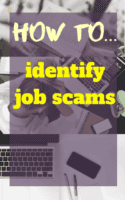Unemployment is at an all-time high in South Africa. Scammers are taking advantage of this by trying to make money off job seekers.
Here are some red flags to look out for:
• The company asks you to pay a certain fee – Job scammers sometimes explain this by saying you are paying for training for the job. Most reputable employers will never ask for money for anything!
• You are promised high pay for not much work – If it sounds too good to be true then it probably is! Genuine job adverts are more likely to mention your yearly package rather than your monthly one.
• ‘You can’t visit our offices, renovations currently underway’ – This is quite common in job scams and it’s because they haven’t got offices to begin with!
• You are already hired, no need for an interview – No matter how good your CV looks, companies won’t just employ you without interviewing you first.
• You’ll be asked to send personal information – Don’t! Legit employers only need the kind of information on your CV – nothing more, and never your bank details! Scammers use this personal information to apply for credit cards and loans.
• No specific skill, experience needed – Scammers use this trick so the job advert can appeal to as many people as possible. Employers will know what skills they require from a candidate and will state this in the job advertisement.
As it’s impossible to list all the red flags here, so below are some checks you can do beforehand:
• Use the internet to check on the company – Search for name of the company on Google to see if anyone has written about it and how long it has been around. Google the physical address if it’s given in the advert to see if the offices actually exist.
If it’s a legitimate company and you are still suspicious, go to the company’s original website, get their number and phone them to check that it’s a valid advertisement.
Verify the website address (URL) – Look for the simplest details. Companies usually have simple addresses and scammers will slightly modify it with something that’s not easily noticeable.
For example, instead of www.fundza.co.za (original) they’ll have something like www.fundz’a.co.za (note the apostrophe between ‘z’ and ‘a’). It looks the same at first glance but it’s not!
• Check for grammar and spelling errors – Genuine recruiters are professionals who pay attention to every detail. So if the advert has too many errors, then think twice.
Job scams are getting more common. If your instinct says a job advert is fake – then it probably is!
Tell us: Have you had any experience of responding to a fake job advert? Was there anything that alerted you to it?


